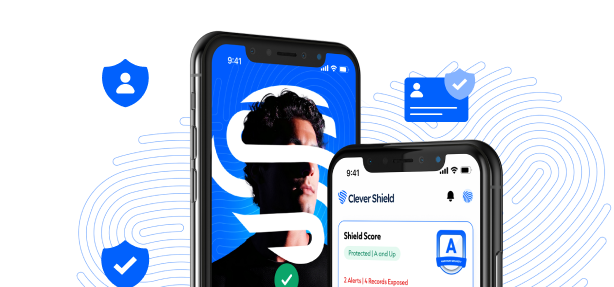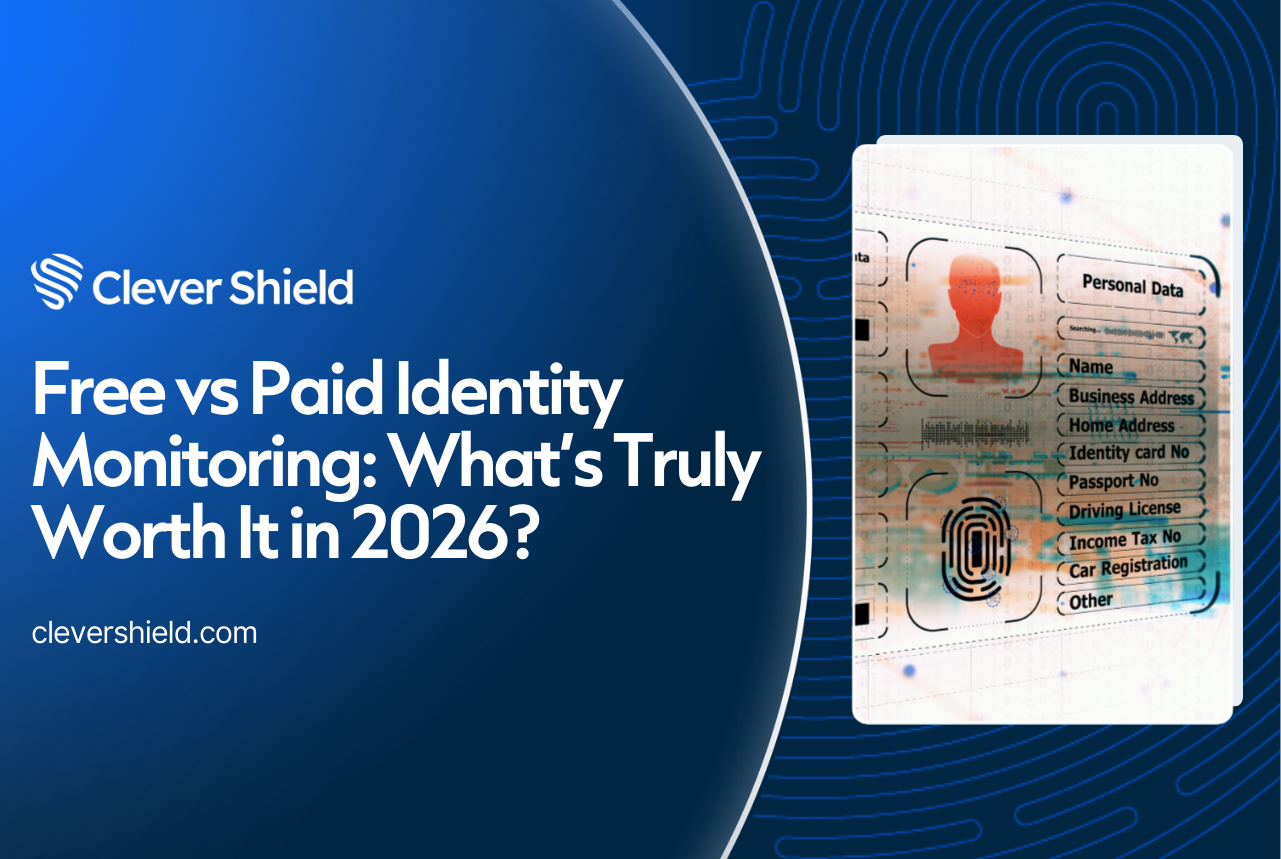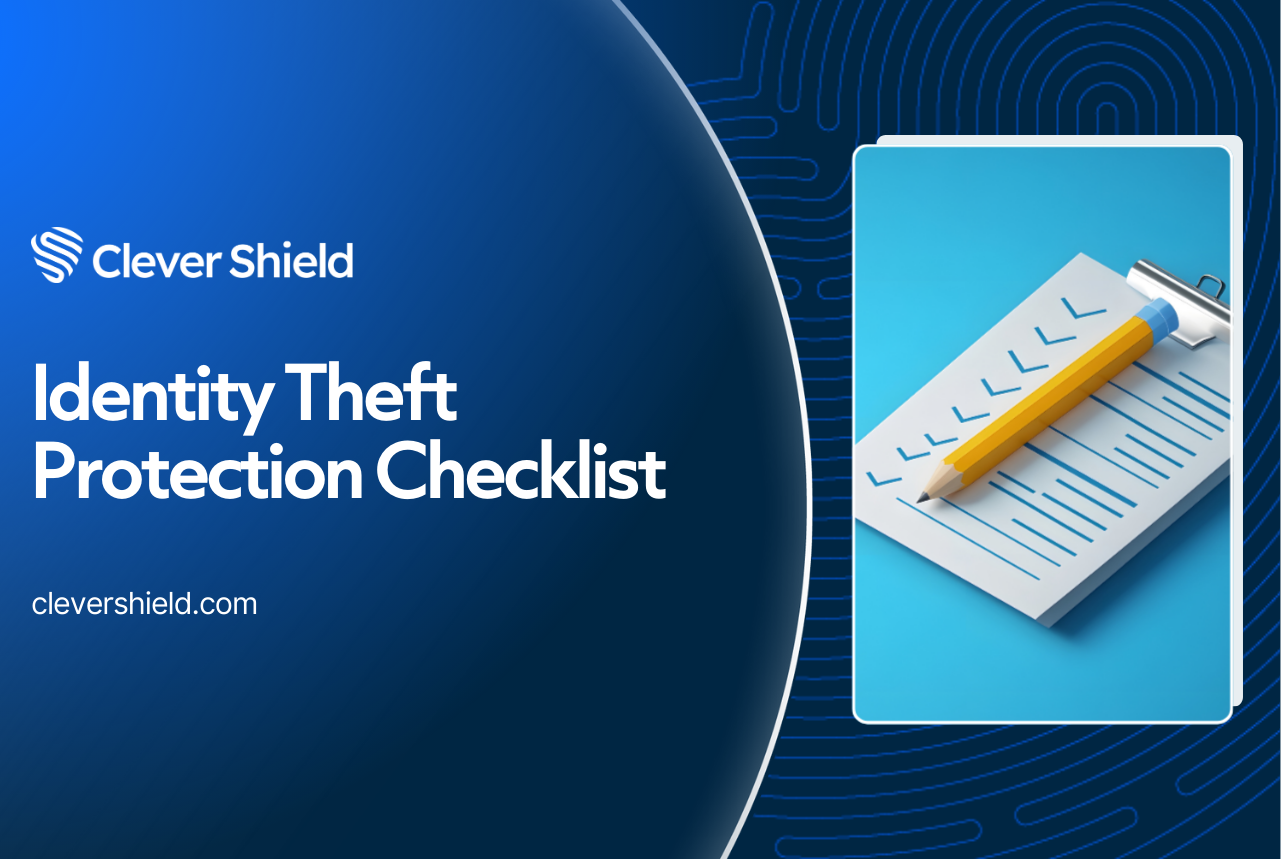If your identity has been stolen, taking quick action is essential. This guide covers how to report stolen identity, from recognizing warning signs to reporting the incident and securing your accounts.
Key Takeaways
Recognize warning signs of identity theft, including unusual account activities and missing mail, to enable early detection.
Take immediate action by contacting financial institutions, placing fraud alerts, and filing a police report to secure your identity.
Utilize resources such as the FTC, AARP Fraud Watch Network, and services like Clever Shield for comprehensive support and guidance in reporting and recovering from identity theft.
Recognize the Warning Signs of Identity Theft
Identity theft is the unauthorized use of personal or financial information, and recognizing its warning signs is crucial for protection. Key indicators include unusual credit report activity and unfamiliar accounts. A person may notice id theft can manifest in similar ways.
Frequent reviews of your bank statements and bills for unauthorized items, unrecognized accounts, and unexplained withdrawals can help detect identity theft early. Unfamiliar letters or notices from the IRS can also suggest identity theft, especially in cases of tax-related fraud.
Unrecognized Purchases
One of the most obvious signs of identity theft is unrecognized purchases on your bank or credit card statements. Regularly reviewing these statements can help you spot unauthorized transactions as soon as they occur. Look for any unfamiliar charges that you did not authorize.
Report any suspicious transactions immediately to your bank or credit card provider and consider placing fraud alerts on your credit reports to safeguard against further unauthorized activities.
Missing Bills or Mail
Not receiving expected bills or other mail can be a potential sign of identity theft. If you notice a sudden stoppage of expected mail, it could suggest that your identity has been compromised.
Thieves may change your billing address to divert your mail, preventing you from noticing unauthorized transactions or new account notifications.
Unexpected Account Notifications
Receiving a notification about new accounts that you did not authorize can indicate identity theft. These could come in the form of emails, letters, or phone calls.
Quick action is necessary if you receive unexpected account notifications to secure your identity and prevent further damage.
Immediate Steps to Take if Your Identity is Stolen
Immediate action is required upon realizing your identity has been stolen. Receiving bills for items you didn’t purchase, debt collection calls for accounts you did not open, or denial of loan applications can all signal that your identity has been misused.
Notify your financial institutions immediately to report the theft and request an account freeze to prevent further unauthorized transactions. Also, report the identity theft to multiple agencies, including local police and federal organizations.
Contact Financial Institutions
Informing financial institutions helps prevent further unauthorized transactions and protects your accounts. To do this:
Contact your bank immediately to report the identity theft.
Contact your credit card companies immediately to report the identity theft.
Discuss options for securing your accounts with these institutions.
Request your bank and credit card companies to freeze your accounts to prevent any further fraud. Keep detailed records of communications when notifying creditors about identity theft.
Place Fraud Alerts
Fraud alerts can be placed on your credit reports by contacting the major credit bureaus. You can contact Equifax, Experian, and TransUnion online, by phone, or by mail to set up fraud alerts or security freezes. Fraud alerts on credit reports prompt potential creditors to verify identity before issuing credit.
Equifax offers online resources for placing fraud alerts and locking credit files.
File a Police Report
Reporting identity theft to local law enforcement formally documents the crime incident. Gather necessary documents such as identification, proof of theft, and any additional steps for filing the report.
Obtain a copy of the police report once filed; it is essential for further actions in combating identity theft. Having a police report can assist in disputing fraudulent charges, securing affected accounts, and proving identity theft to creditors.
Reporting Identity Theft to Authorities
After filing a police report, report identity theft to various government agencies and organizations. Documenting the theft is crucial and may be required by creditors to address fraudulent accounts.
You can report identity theft through IdentityTheft.gov, which offers a comprehensive resource for victims. File reports with various government agencies and organizations to ensure all bases are covered.
Federal Trade Commission (FTC)
The Federal Trade Commission (FTC) is a government agency that helps consumers prevent identity theft and provides a way to report it. Filing a report with the FTC helps establish a record of the theft, aiding in dealing with financial institutions and creditors.
You may need to provide specific information regarding the theft, such as the details of the incident and any unauthorized accounts.
Internal Revenue Service (IRS)
If you believe you have been a victim of tax-related identity theft, you may need to file Form 14039 with the IRS. Prompt reporting helps mitigate potential issues with the IRS regarding tax-related identity theft.
Filing Form 14039 alerts the IRS and helps to address the problem swiftly.
Social Security Administration (SSA)
Notify the Social Security Administration (SSA) if your social security numbers have been compromised to prevent further misuse.
Notify the SSA immediately to take preventive measures against potential fraud.
Notifying Credit Bureaus and Other Organizations
To report identity theft, individuals should contact the Federal Trade Commission or the major credit reporting agencies. Notify the major credit bureaus to initiate protective measures. Fraud alerts on your credit report require creditors to verify your identity before issuing credit.
Freezing your credit prevents identity thieves from opening accounts in your name. The Attorney General’s Office provides resources to assist in reporting identity theft to creditors and credit bureaus.
Contacting Credit Bureaus
You can reach Equifax at 888-378-4329, TransUnion at 800-916-8800, and Experian at 888-397-3742 for credit-related inquiries. The three major credit bureaus in the United States are Equifax, Experian, and TransUnion.
Contacting these bureaus enables you to place fraud alerts or freezes, protecting your credit from unauthorized access. Maintain a record of all communications with credit bureaus, including dates, times, and representatives’ names.
Informing Other Creditors
Inform your creditors immediately about the identity theft to secure your accounts and prevent unauthorized transactions. Contact creditors, lenders, and service providers promptly to prevent unauthorized transactions on your accounts.
Informing lenders and utility companies promptly can help secure your money accounts against fraudulent activities.
Using Clever Shield Services
Clever Shield assists in notifying relevant organizations about identity theft incidents. The service can manage the reporting process by notifying various organizations on your behalf. Clever Shield offers automated notifications to multiple organizations to streamline the reporting process.
This service simplifies notifying organizations about identity theft and managing reports.
Protecting Yourself from Future Identity Theft
Preventive measures can significantly reduce the risk of becoming a victim of identity theft. Regular monitoring of bank and credit card statements helps spot unauthorized transactions. Using strong passwords and regularly updating them safeguards personal accounts against identity theft.
Clever Shield offers insurance coverage designed for identity theft protection, providing peace of mind.
Real-Time Monitoring
Real-time monitoring services alert users immediately to any suspicious activity involved with their responsible personal information on the website. This allows a complete prompt act to answer prevent further damage.
Report identity theft to your bank and credit card issuers to avoid additional charges and secure your accounts. Banks and credit card companies can provide assistance in preventing further unauthorized transactions.
Automated Data Removal
Automated data removal services eliminate personal information from online databases and websites that identity thieves may exploit on a specific date. Removing sensitive information from unsecured online sources reduces the risk of identity theft.
Automated data removal swiftly eliminates sensitive information from public databases, reducing the risk of identity exposure. These services ensure personal information is deleted from unsecured sites, reducing exposure to identity theft.
Dark Web Alerts
Monitoring the dark web for your personal information provides early warnings if your data is compromised. This enables individuals to receive notifications if their sensitive data is found being traded or sold illegally. Alerts when personal information is found on the dark web enable quick action to prevent further identity theft.
Monitoring the dark web for stolen data provides early warnings, allowing individuals to take preemptive steps to protect themselves.
Additional Resources and Support
Additional resources and support options assist identity theft victims in navigating the recovery process. The Attorney General’s Office offers resources to help victims report identity theft to creditors and credit bureaus, including information from gov agencies.
The AARP Fraud Watch Network offers valuable resources to help individuals recognize and avoid scams. Victims should reach out and utilize available resources for guidance and support.
Government Resources
The AARP Fraud Watch Network offers resources to help victims of scams and identity theft. AARP offers a helpline for fraud victims, providing free assistance and support to navigate the impacts of scams. Victims can receive guidance on dealing with identity theft through the AARP Fraud Watch Network helpline.
AARP offers online support sessions for emotional assistance to those affected by identity theft.
Non-Profit Organizations
The AARP Fraud Watch Network offers:
Resources and support specifically aimed at helping seniors protect themselves against identity theft.
Free resources and support to help individuals avoid scams and recover from identity theft.
Educational materials and alerts to raise awareness about common scams targeting seniors.
They also provide one-on-one support for individuals affected by identity theft to help guide them through recovery.
Clever Shield Assistance
Consumers can call Clever Shield for assistance regarding identity theft at 866-999-5630. The Illinois Identity Theft Hotline offers one-on-one assistance to report incidents and repair credit. Individuals with hearing or speech disabilities can contact the Illinois Identity Theft Hotline using the 7-1-1 relay service.
Clever Shield provides comprehensive support and resources for identity theft victims.
Summary
Identity theft is a serious issue that requires immediate action and ongoing vigilance. From recognizing the warning signs to taking immediate steps, reporting to authorities, and protecting yourself from future incidents, there are multiple layers to managing this threat. Clever Shield can be an invaluable ally in this journey, providing automated data removal, dark web alerts, and real-time monitoring to help you stay one step ahead of identity thieves. Remember, the key to combating identity theft is to stay informed, act quickly, and use the resources available to you. By following the steps outlined in this guide, you can protect your personal and financial information and minimize the risk of identity theft.
Frequently Asked Questions
What should I do first if I suspect my identity has been stolen?
If you suspect your identity has been stolen, you should contact your financial institutions immediately to report the theft and request a freeze on your accounts to prevent further unauthorized transactions. Taking swift action is crucial to protecting your finances.
How do I place a fraud alert on my credit reports?
To place a fraud alert on your credit reports, contact the major credit bureaus—Equifax, Experian, and TransUnion—via their websites, by phone, or through the mail. This proactive step helps protect your credit from potential fraud.
Why is it important to file a police report after identity theft?
Filing a police report after identity theft is crucial as it formally documents the incident, aiding in disputing fraudulent charges and protecting your rights. This step provides a necessary record to help secure your affected accounts.
How can Clever Shield help me with identity theft?
Clever Shield helps protect against identity theft through automated data removal, real-time alerts, and dark web monitoring, effectively reducing your risks. This comprehensive approach enables you to stay vigilant and safeguard your personal information.
Are there resources available for emotional support after identity theft?
Yes, resources for emotional support after identity theft are available, such as the AARP Fraud Watch Network, which offers helplines and online support sessions to assist those affected.






